(Reported by Guo Jiaxin and Zhao Jiatong) On July 18th, in Room 414 of the Complex Building in the North Area, Zhang Tingting, a student from the Department of Journalism and Communication of the School of Arts and Communication, couldn’t help but feel happy as she watched the preliminary edited teaching internship video work on the screen: “During this trip to Badong, although I was busy filming every day for 7 days, and then went back to school to repeatedly improve the script editing video, I really felt a sense of achievement when I saw the results.”
From July 5 to 12, the Radio and Television Studies Program of the Department of Journalism and Communication carried out field teaching practice in Badong County, Enshi Prefecture, Hubei Province. This teaching practice, under the collective guidance of six teachers, including Zhang Meizhen, Liu Dingyao, Ning Wei, Huang Aiwu, Shang Yuanyuan and Wang Dajun, 39 sophomores majoring in radio and television studies were divided into nine groups, and went deep into Badong County to shoot around topics such as geographical science popularization, rural revitalization and intangible heritage inheritance.
This is the first time that the major of radio and television studies organized students to carry out teaching practice in Badong Science and Education Base in response to the call of the University, and is also the restart of off-campus centralized teaching practice after three years of the COVID-19.
In order to ensure the smooth progress of this teaching practice, from June 13 to 16, Ms. Ning Wei and Ms. Huang Aiwu from the major of Radio and Television Studies, went to Badong County for practice research under the organization of Undergraduate School, to help follow-up students determine the shooting topic. The group of instructors prepared lessons collectively multiple times. On July 3, the major of Radio and Television Studies held a report meeting on topic selection, the instructors involved in this teaching practice provided collective guidance and control over the topic selection, ensuring the steady progress of the teaching practice.
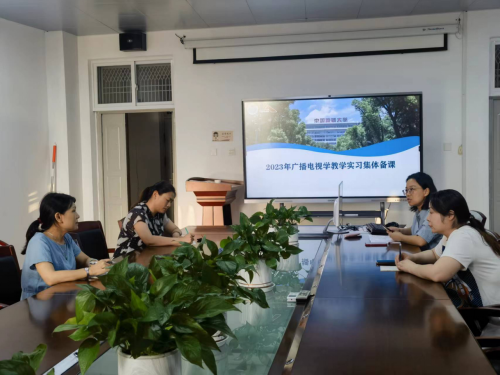
The group of instructors prepared lessons collectively
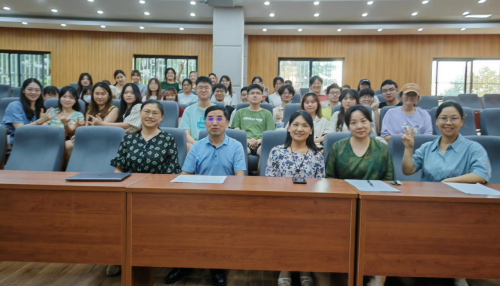
A group photo of teachers and students on July 3 after the first topic selection report meeting for the teaching practice of sophomore students majoring in Radio and Television Studies
After 7 days of filming, the students witnessed the sunrise and sunset in Badong, experienced the local customs and traditions, and gained their own unique rewards in exploring Badong. “The land of Badong has brought us a lot of inspiration, and coming to Badong for this teaching practice is a great opportunity to practice. We combined theory with practice to deeply appreciate the connection between the two, and also felt the importance of practice more.” Cao Yiyang said.
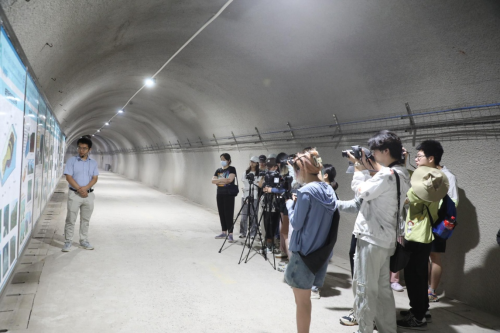
The picture shows students interviewing and filming at the Badong Field Comprehensive Experimental Site.
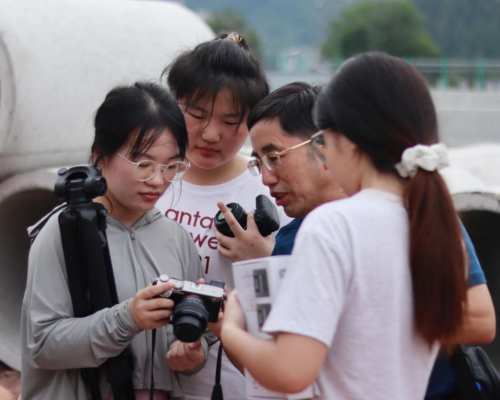
The picture shows Mr. Liu Dingyao (second from right) guiding students on site
On July 12, the sophomore teachers majoring in radio and television studies and the teachers left the Badong Science and Education Base of China University of Geosciences (Wuhan) and returned to school for subsequent editing work.
Emphasis on practical teaching is a long-standing tradition of the major of Radio and Television Studies of the Department of Journalism and Communication of the School of Arts and Communication. The program implements a four-level practical teaching system composed of course internship, teaching internship, vacation internship, and graduation internship. From the cognitive internship in freshman year to the graduation internship in senior year, all internships last for more than 30 weeks.
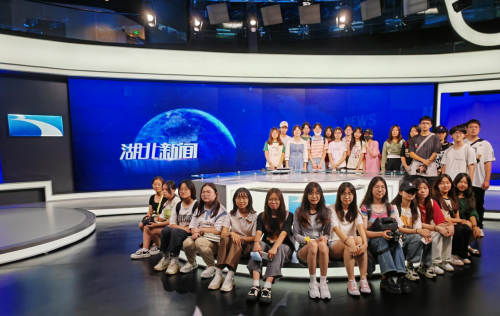
The picture shows the cognitive internship for freshmen majoring in Radio and Television Studies at Hubei TV Station on June 30th
In order to solidly promote the combination of theoretical learning and practical training, and cultivate new audio-visual communication talents with full skills, the Radio and Television Studies Program has been expanding its teaching practice platform. On campus, professional platforms such as TV editing laboratories and virtual studios have been established successively; off campus, relying on Zigui Practice Base, Lushan Practice Base, Hubei Enshi Sobuya Practice Base, Badong Practice Base, etc., it has continuously innovated and enriched the content, forms, and methods of practical teaching. At the same time, it continues to explore innovative paths of cooperation between schools and media, has signed strategic cooperation agreements with Hubei Radio and Television Group, Xinhua News Agency Hubei Branch, Pear Video and other off-campus media, to provide more and better platforms for journalism students to improve their professional and practical skills, and to grow up to be the innovative media talents needed by the times.
The subject competitions are of great significance to the cultivation of students’ practical and innovative abilities. For a long time, the major of Radio and Television Studies has insisted on promoting learning by competitions, taking subject competitions as the new normal in practical training and teaching, and stepping up efforts to organize students to participate in all kinds of scientific and technological activities and competitions at school level or above, so as to let the students grow up in the competitions, and to become a success in practice. Each year, more than 60% of the students in this major participate in innovation and entrepreneurship practices and subject competitions. According to incomplete statistics, more than 100 works of this major have won awards in the National Advertising Art Design Competition for College Students, the National Science Popularization Explanation Contest, Hubei Journalism Practice Skills Competition for College Students and other competitions in the past five years.
Practice is the experience and exercise for students before they enter the society. Under the tradition of emphasizing practice, the practice and innovation of Radio and Television Studies has been effective in educating people, and the professional skills and level of students and graduates have been highly recognized by the society. In the past three years, graduates from the major have won more than 70 awards at all levels in various domestic professional competitions and activities. Wang Chengdong, Shi Hanwei and Li Qiang have been awarded the first prize of China News Award, among which Li Qiang and Shi Hanwei have also become the members of the main lecture group of the 2020 China News Communication Forum sponsored by the Ministry of Education and the Propaganda Department of the Communist Party of China. Employers generally state that students trained in this major are capable of cultivating and practicing a sense of patriotism, and are news talents with “four directions and four actions”.
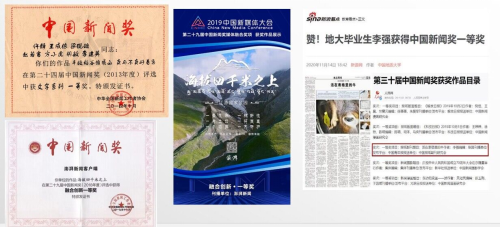
Graduates from the major of Radio and Television Studies have won the first prize of the China Journalism Award many times
Professor Zhang Meizhen, deputy dean of the School of Arts and Communication and head of the Major of Radio and Television Studies, said, “At this stage, according to the needs of the Party’s news and communication cause, the Major of Radio and Television Studies adapts to the extensive demand of the society for audio-visual communication talents, is based on the reality of the integrated development of radio and television and new media, and is committed to cultivating all-skilled new audio-visual communication talents. In the future, the major will continue to strengthen social practice, improve students’ practical skills, and comprehensively cultivate innovative, all-media, and composite audiovisual communication talents who are ‘able to speak, write, and act’ as required by the times.”